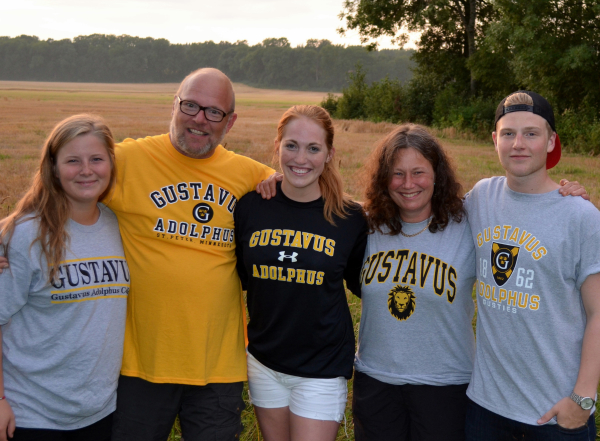Lindsay Rothschiller received one of the first Wallenberg Scholarships in order to study the Carbon Lock-in phenomenon in Sweden. Last Wednesday, Nov. 12 Rothschiller presented her findings to Gustavus with her host family by her side.
Rothschiller, a Physics and Environmental Studies major, worked and lived with Magnus Fredricson and his family in Lidköping, Sweden. Fredricson studies Carbon Lock-in which Rothschiller described as a cycle that causes society to depend on carbon.
“Carbon Lock-in is the word that describes the fact that carbon technology creates a system and it has a bunch of interlocking systems that are all connected,” Rothschiller said.
Rothschiller’s focused on looking into the three areas of breaking through the cycle which takes societal change which then requires public, financial, and political support.
“My findings were that financial support would be the easiest and most efficient way to start gaining the other two forms of support to start breaking through those systems,” Rothschiller said.
Chemistry and Environmental Studies Professor Jeff Jeremiason was the one who helped connect Rothschiller with Fredricson.
“Magnus was someone I met when I was on sabbatical in Sweden… so when we got this money through the Wallenberg Foundation we just started connecting people with who we knew in [Sweden] so now Magnus has had two students so far that have worked with him,”Jeremiason said.
Jeremiason talked about how her experience was not a typical internship with Rothschiller being able to stay in the guest cottage at Fredricson’s family farm, growing very close with them.
“One of the things that they had to work out was housing and Magnus said well you can just live on our farm so Lindsay lived in the guest house at their farm, so she’s like a daughter to them now,” Jeremiason said.
Rothschiller talked about the highlight of the opportunity, which was the great experience with her host family and falling in love with Sweden.
“I really fell in love with the country, with the people there, the culture, everything. It was really interesting going to meetings with Magnus, seeing how Sweden operates compared to America and just hanging out with my host family,” Rothschiller said.
Rothschiller’s host family, Magnus and his wife Karen, came last week to give the lecture with her and also to talk to students and other classes in order to promote the Wallenberg program.
Barb Larson Taylor, Director for the Center of Servant-Leadership described how the Wallenberg Scholarship started only last yaer, due to Tom Young, Vice President of Advancement, reaching out the Wallenberg Foundation, and the Foundation itself eager to start working with students more.
“Gustavus has had a long term relationship with the Wallenberg Foundation in Sweden… in the conversation Tom Young had with the Wallenberg Foundation folks, the foundation indicated they had a interest in something that would have something to do with student exchange,” Taylor said.
The Wallenberg Foundation has now sent nine students to Sweden doing a variety of work. There are two students going this January and seven this summer.
Taylor is very excited to see an increase in interest in the program since it is so beneficial in the areas of cultural emersion and experiential learning towards a students’ career.
“I think its two things, anything that’s cultural immersion is great whether it’s Sweden or anywhere else… anything where you are really getting out of your comfort zone and seeing another culture and getting immersed in it, that would be great. Two, it is a career related experiential applied learning experience, experiential learning towards your career, so now [the Wallenberg Scholarship] combines those two,” Taylor said.
The new Wallenberg Scholarship It provides more than just a sum of money for students to intern in Sweden, but also a chance of cultural immersion and expansion of new experiences.
-Christine Peterson
